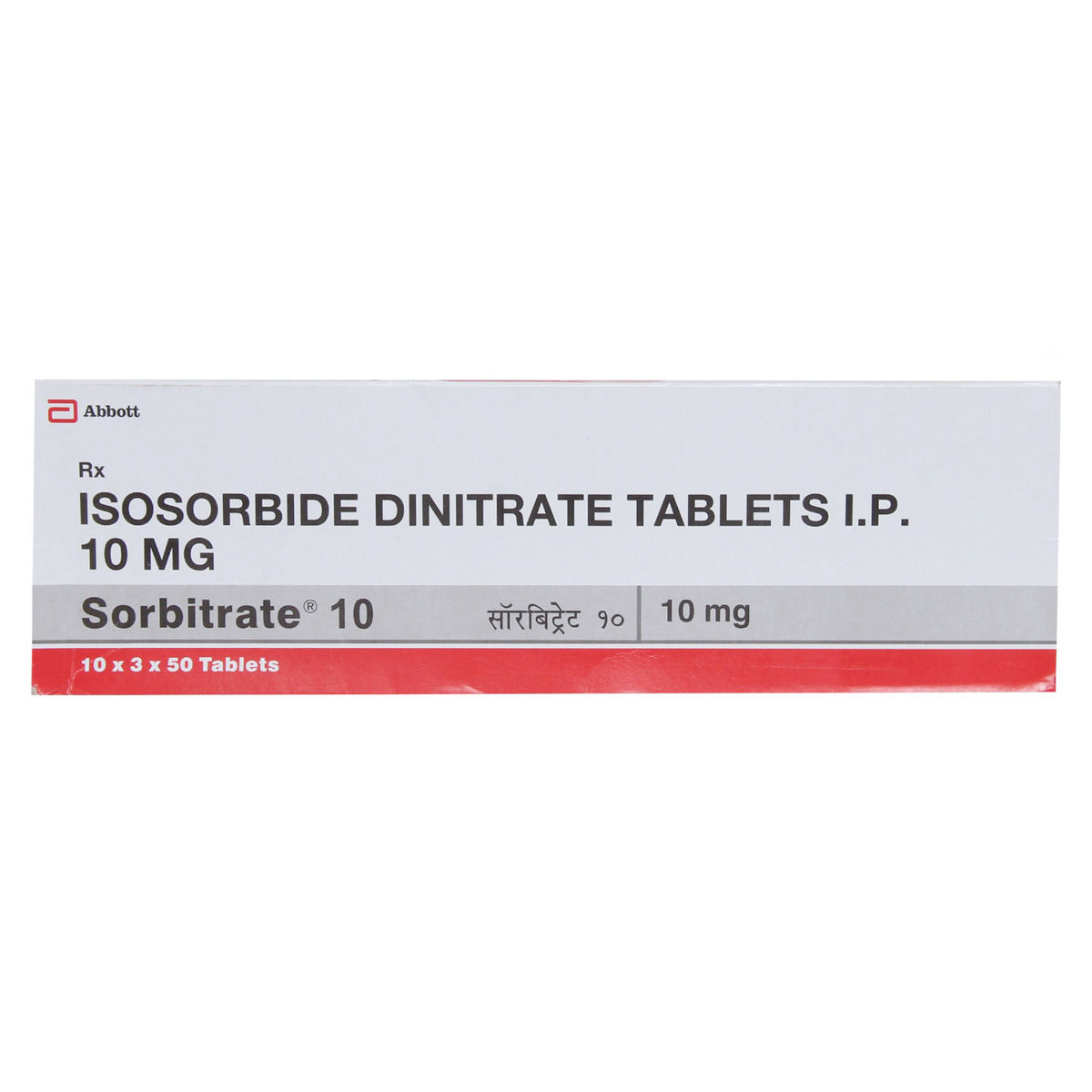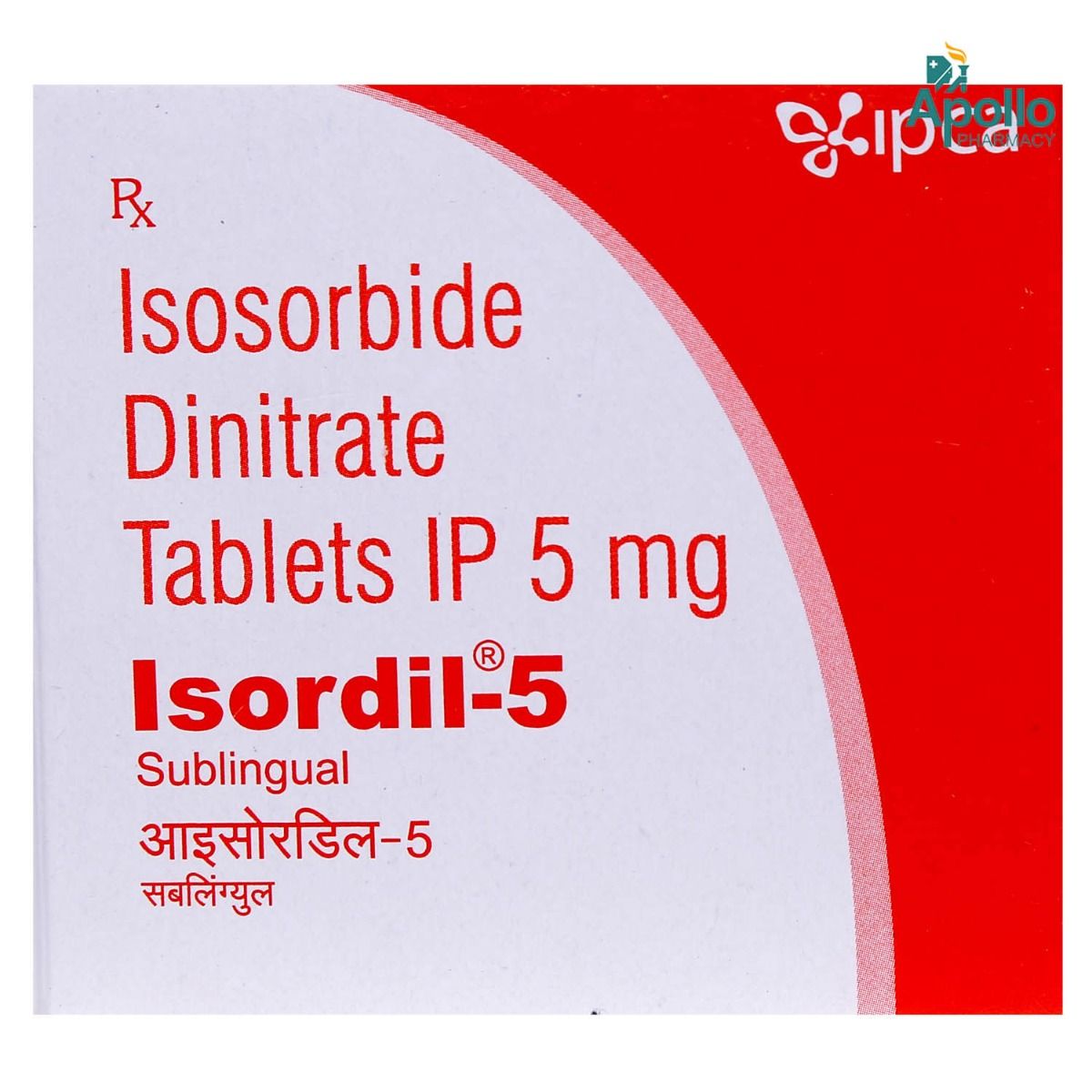Isosorbide Dinitrate
About Isosorbide Dinitrate
Isosorbide Dinitrate belongs to the class of medications called ‘nitrate vasodilators’ used in the prevention of angina (heart-related chest pain) and heart failure. Angina pectoris (angina) is chest pain occurring due to reduced blood flow to the heart (coronary artery disease). It occurs when the blood vessels supplying blood to the heart are blocked or narrowed.
Isosorbide Dinitrate contains ‘isosorbide dinitrate’, which works by dilating, relaxing, and widening the constricted blood vessels, thereby increasing the blood and oxygen supply to the heart. Thus, it effectively helps prevent the risk of future heart attack and stroke, especially in high blood pressure patients.
Take Isosorbide Dinitrate as prescribed. Your doctor will advise you on how often you need to take Isosorbide Dinitrate based on your medical condition. The common side effects of Isosorbide Dinitrate are headache, light-headedness, weakness, nausea, vomiting, and dizziness. These side effects usually resolve without requiring medical attention. However, consult your doctor if any of these effects persist or worsen.
Do not take Isosorbide Dinitrate if you are allergic to any of its ingredients. Inform your doctor if you are taking other prescription or non-prescription medicines, especially medicines used to treat erectile dysfunction in men. Consult your doctor if you are pregnant or breastfeeding. The safety and effectiveness of Isosorbide Dinitrate in children have not been established.
Uses of Isosorbide Dinitrate
• Angina pectoris treatment: Isosorbide Dinitrate helps to relieve angina pectoris symptoms by widening blood vessels and improving blood flow to the heart, reducing chest pain.
• Prevention of angina attacks: Isosorbide Dinitrate can be administered to prevent the occurrence of angina attacks, especially during physical activity or stressful situations.
• Management of heart failure: Isosorbide Dinitrate helps to manage heart failure symptoms by reducing the heart's workload and improving blood flow, often used alongside other medications for better heart function.
• Vasodilation: Isosorbide Dinitrate works by causing vasodilation, widening blood vessels, which reduces blood pressure and decreases the heart's workload, providing relief.
• Post-myocardial infarction care: Isosorbide Dinitrate helps to improve oxygen supply to the heart and reduces cardiac workload in post-heart attack patients, supporting recovery and potentially lowering the risk of future heart issues.
Medicinal Benefits
Isosorbide Dinitrate belongs to the class of medications called ‘nitrate vasodilators’ used in the prevention of angina (heart-related chest pain) and heart failure. It contains ‘isosorbide dinitrate’, which works by dilating, relaxing, and widening the constricted blood vessels, thereby increasing the blood and oxygen supply to the heart. Thus, it effectively helps prevent the risk of future heart attack and stroke, especially in high blood pressure patients.
Directions for Use
- Isosorbide Dinitrate can be taken with or without food as advised by your doctor.
- Follow your doctor's instructions on the dosage and timing of this medication.
- Place Isosorbide Dinitrate below the tongue and allow it to dissolve.
- Do not swallow Isosorbide Dinitrate as a whole directly. It is also advised not to chew or crush Isosorbide Dinitrate.
Side Effects of Isosorbide Dinitrate
- Headache
- Light-headedness
- Weakness
- Nausea
- Vomiting
- Dizziness
Drug Warnings
Do not take Isosorbide Dinitrate if you are allergic to ‘isosorbide dinitrate’ or any of its contents. Inform the doctor if you have severe low blood pressure, bleeding or increased pressure in the brain, severe dehydration, heart valve problems, inflammation of the heart wall, high blood pressure due to long-term lung disease, severe anaemia, glaucoma (increased pressure in the eye), glucose 6 phosphate dehydrogenase deficiency (a type of anemia), underactive thyroid (hypothyroidism), kidney or liver problems, head injury, hypothermia (low body temperature), or intolerance to some sugars. Consult your doctor if you are pregnant or breastfeeding. Isosorbide Dinitrate is not recommended for children as safety and effective have not been established.
Drug Interactions
Drug-Drug interactions: Isosorbide Dinitrate should not be used with organic nitrate drugs used to treat erectile dysfunction (sildenafil, vardenafil, tadalafil), medicines used to treat pulmonary hypertension (riociguat), or phenothiazines.
Drug-Food interactions: No interactions found.
Drug-Disease interactions: Inform your doctor if you have a history of acute myocardial infarction or congestive heart failure, severe hypotension (low blood pressure), severe anaemia, head injury, or glaucoma.
Drug-Drug Interactions Checker List:
Safety Advice

Alcohol
cautionAlcohol may worsen the condition by increasing the risk of side effects. So, do not consume alcohol.

Pregnancy
cautionPlease consult a doctor if you are pregnant or planning for pregnancy. Your doctor will prescribe only if the benefits outweigh the risks.

Breast Feeding
cautionIt is not known if isosorbide dinitrate passes into breastmilk. Please consult your doctor before taking Isosorbide Dinitrate if you are a breastfeeding mother.

Driving
cautionIsosorbide Dinitrate may cause dizziness and affect your ability to drive. So, avoid driving or operating heavy machinery while using Isosorbide Dinitrate unless you are alert.

Liver
cautionInform your doctor if you have liver impairment. Your doctor will weigh the benefits and any potential risks before prescribing.

Kidney
cautionInform your doctor if you have kidney impairment. Your doctor will weigh the benefits and any potential risks before prescribing.

Children
cautionIsosorbide Dinitrate should not be given to children as safety and effectiveness were not established.
Habit Forming
Diet & Lifestyle Advise
- Eat plenty of fresh fruits and vegetables.
- Choose whole grains rather than refined or polished grains, lean proteins, such as skinless chicken and fish, and non-fat or low-fat dairy products.
- Do not take food containing high levels of sodium (salt).
- Drink plenty of fluids to prevent dehydration.
- Maintain a normal weight. Shed excess weight by exercising regularly for at least 30 minutes a day.
- Manage stress with yoga or meditation.
- Limit alcohol intake and quit smoking.
Patients Concern
Disease/Condition Glossary
Angina pectoris: It is the medical term for heart-related chest pain. It occurs when there is a reduction in blood supply to the heart due to the blockage of one or more arteries (coronary heart disease). Patients with angina often describe chest pain as squeezing, tightening, or pressure in the chest. Other symptoms can be dizziness, sweating, heartburn, and difficulty breathing.
Heart failure: It is a condition in which the heart is unable to pump blood as effectively as it should. Conditions such as coronary artery disease, arrhythmia, congenital heart defect, diabetes, overactive/underactive thyroid, or high blood pressure make the heart too weak to pump blood efficiently. Symptoms of heart failure include shortness of breath, rapid heartbeat, swollen legs, and fatigue.
FAQs
Isosorbide Dinitrate is used to prevent angina (heart-related chest pain) and heart failure.
Isosorbide Dinitrate works by relaxing the muscles of the blood vessels. It helps to dilate the narrowed blood vessels, resulting in increased blood and oxygen supply to the heart. This prevents heart-related chest pain known as angina.
Isosorbide Dinitrate may decrease blood pressure (hypotension). Therefore, let the doctor know if you have high/low blood pressure or if you are taking blood pressure medications.
Use of Isosorbide Dinitrate together with sildenafil is not recommended as it may cause a sudden decrease in blood pressure. Therefore, consult a doctor before taking sildenafil during treatment with Isosorbide Dinitrate.
Isosorbide Dinitrate is given for heart-related chest pain (angina), a life-long or chronic disease, especially in high blood pressure patients and coronary heart disease (CAD). So, do not stop taking Isosorbide Dinitrate even if you feel better. Consult your doctor if you have any concerns.
The common side effects of Isosorbide Dinitrate are headache, light-headedness, weakness, nausea, vomiting, and dizziness. These side effects usually resolve without requiring medical attention. However, consult your doctor if any of these effects persist or worsen.






